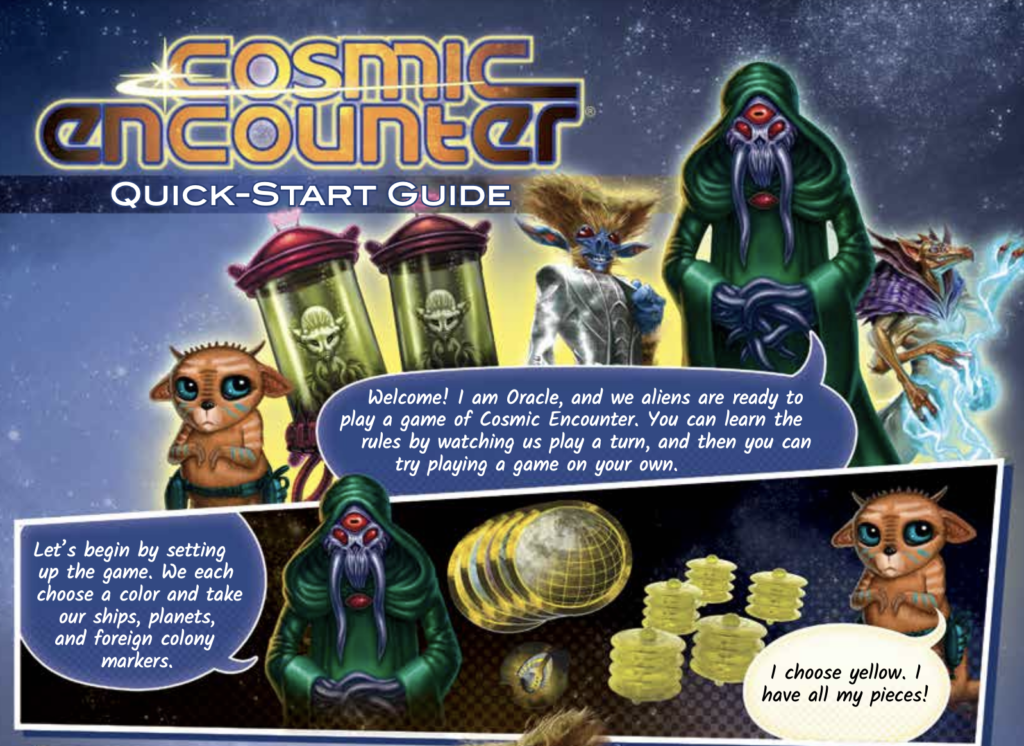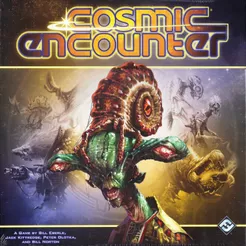Today I played Cosmic Encounter for the first time with two friends of mine. I chose Cosmic Encounter off the shelf because I knew that there were only a couple of mechanics to keep track of (and many edge cases that could be hashed out as they came up). My friends can certainly enjoy complexity, but they, like I, want strategic complexity that emerges from non-complex rules. After reading a nicely crafted set-up guide that took the form of a comic book, we were able to get into the rhythm of the game’s ~3 minute turns after a single round.

The game begins with each player choosing one of over 50 special aliens, and then populating five planets with four ships each. One one’s turn, a random Destiny card tells them who must be the target of their attack, at which point they aim a giant laser at their target. Ships are committed, defenses are bolstered, alliances are made and renegotiated. Once the attacking, defending, and any allying ships involved have been committed, both main parties play an Encounter card in secret to assist their ships in battle. This is the source of much of the game’s bluffing, and it is often the most dramatic part of a player’s turn. After both players reveal their cards, the battle resolves: some ships are destroyed, some are used to colonize the attacked planet, some are ferried back to friendly planets as the result of parley. Players continue until the winner is crowned when one player has ships on five separate enemy planets.

A couple of other rules concern the reacquisition of lost ships and Encounter cards. The most important of the extra rules is that when a player no longer controls at least three of their own planets, they are no longer able to use the special ability of their alien. This gives players an extra incentive to take back their lost planets (other than the incentive to remove another player’s foreign colony and slow down their victory progress).

The special abilities of the aliens are what gives this game its character, not to mention profound replayability. The aliens in the game may passively change the rules in some way, take powerful actions on certain occasions, or do something so warping each turn that the game is fundamentally different for every player involved. The special abilities are intended to produce most to all of the game’s chaos, which allows for a very modular game system. The only expansions released for Cosmic Encounter prior to 2022’s Cosmic Odyssey have consisted of new alien cards, perhaps a new color of ship, and nothing else. Any new mechanic or rule alteration finds a home in one of the game’s characters, which means that players can focus on the game’s core gameplay of battle and diplomacy while also tailoring their specific experience in an uncomplicated way.

My game was a wonderful introduction to Cosmic Encounter. I chose the alien Fido, which retrieves one of the two Encounter cards used in each battle and offers it to another player for a reward. I thought this power would make me a serious kingmaker in a three player game. One of my friends chose an alien that drew cards and retrieved ships any time that another play did so, piggybacking me so that each of my Fido rewards would be enjoyed by both of us. My other friend chose the Gambler, who, when in battle, gets to reveal his Encounter card after seeing his opponent’s. The Gambler declares what his card is, and the other player must accept this declaration or else put his (and the Gambler’s, if he is lying) ships at risk. My friend told the truth almost every battle, but I called one of his bluffs at a crucial moment – which took us to a tense endgame.
Each of us had exactly four colonies on the other players’ planets, one away from victory, and only one was guarding his own planets well enough to retain his alien’s special ability. We each took one turn with everyone on full defense – nobody could allow the attacker to gain a fifth and final colony. The game ended in an epic battle between my two friends, with several cards played and negated and argued over. I ended up striking a deal and ganging up on my weaker friend, establishing a fifth colony in tandem with the attacker and sharing a victory.

All in all, I thought Cosmic Encounter was fantastic. I chose the game because I had heard so many good things about it, and I am happy to report that all of them are true: This is a game that should be played many many times, and preferably with the same people each time. It will support not just a fun game, not just a hundred, but a fun metagame as well. I and my two friends were trying to play by what we thought was a good strategy, but the chaos imposed by our aliens meant that we were having too much fun to notice. What does constitute good strategy? I have no clue after playing only once, which is exactly how it should be.
If you like games that put you face to face with your opponents, games that force you to confront and demand and tell the truth and deceive, then try Cosmic Encounter with some people you like. It will scratch just the itch.
